Few chess players in modern chess provoke debate and polarizing reactions as much as Hans Niemann.
The American grandmaster has become synonymous with controversy. From cheating scandals to bizarre conspiracy theories, Niemann’s story reads like a chess thriller.
Hans Niemann’s controversies have divided the chess community.
Some see him as a deceptive figure whose past misconduct undermines the integrity of chess, while others see him as a talent caught up in a storm of accusations with little over-the-board evidence against him.
But does this make Hans Niemann the most hated player in chess?
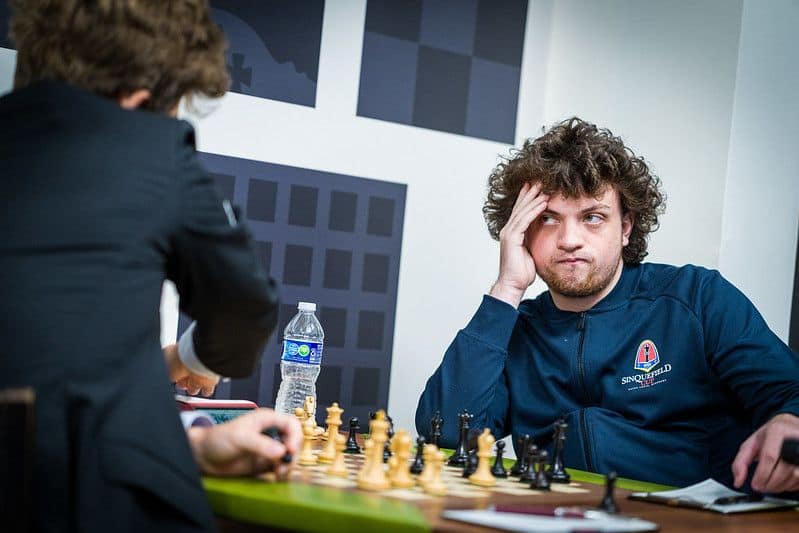
The Magnus Carlsen Cheating Allegations and Their Impact
Hans Niemann is a confident player, and what some would perceive as arrogance. This often rubs people the wrong way.
In addition, Magnus Carlsen controversially altered Niemann’s standing in the chess community with a cryptic tweet. It sparked the biggest scandal in modern chess.
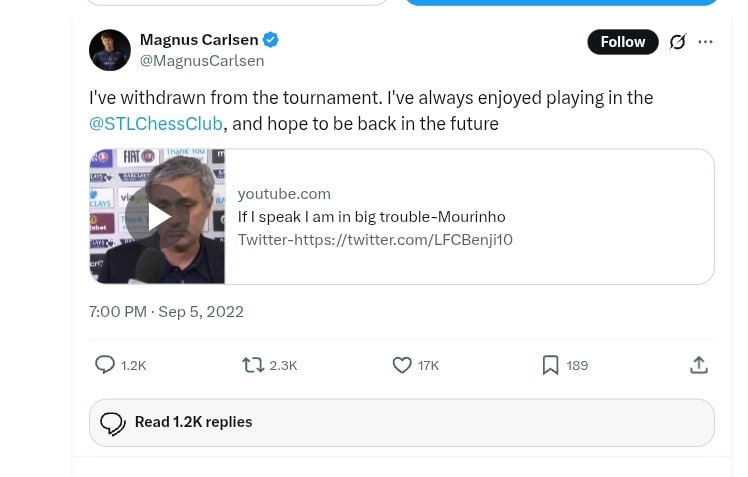
The Sinquefield Cup Incident and Withdrawal
The drama began at the prestigious Sinquefield Cup in St. Louis. Niemann, playing with the black pieces, defeated the five-time world champion in 43 moves.
What should have been a career-defining victory turned into chess’s biggest controversy.
Carlsen’s reaction was swift and shocking. Carlsen withdrew from the tournament. His withdrawal was interpreted as an accusation of cheating against Niemann.
Niemann’s post-game interview, where he struggled to explain his preparation, fueled the drama.
The Online Resignation and Public Statements
Carlsen’s next move was even more dramatic. When the two players met again online, Carlsen played just one move before resigning.
This move effectively accused Niemann of cheating in front of a global audience.
Carlsen later explicitly accused Niemann of cheating, stating he believed he had cheated more often.
Carlsen’s reputation and careful choice of words gave significant weight to these allegations.
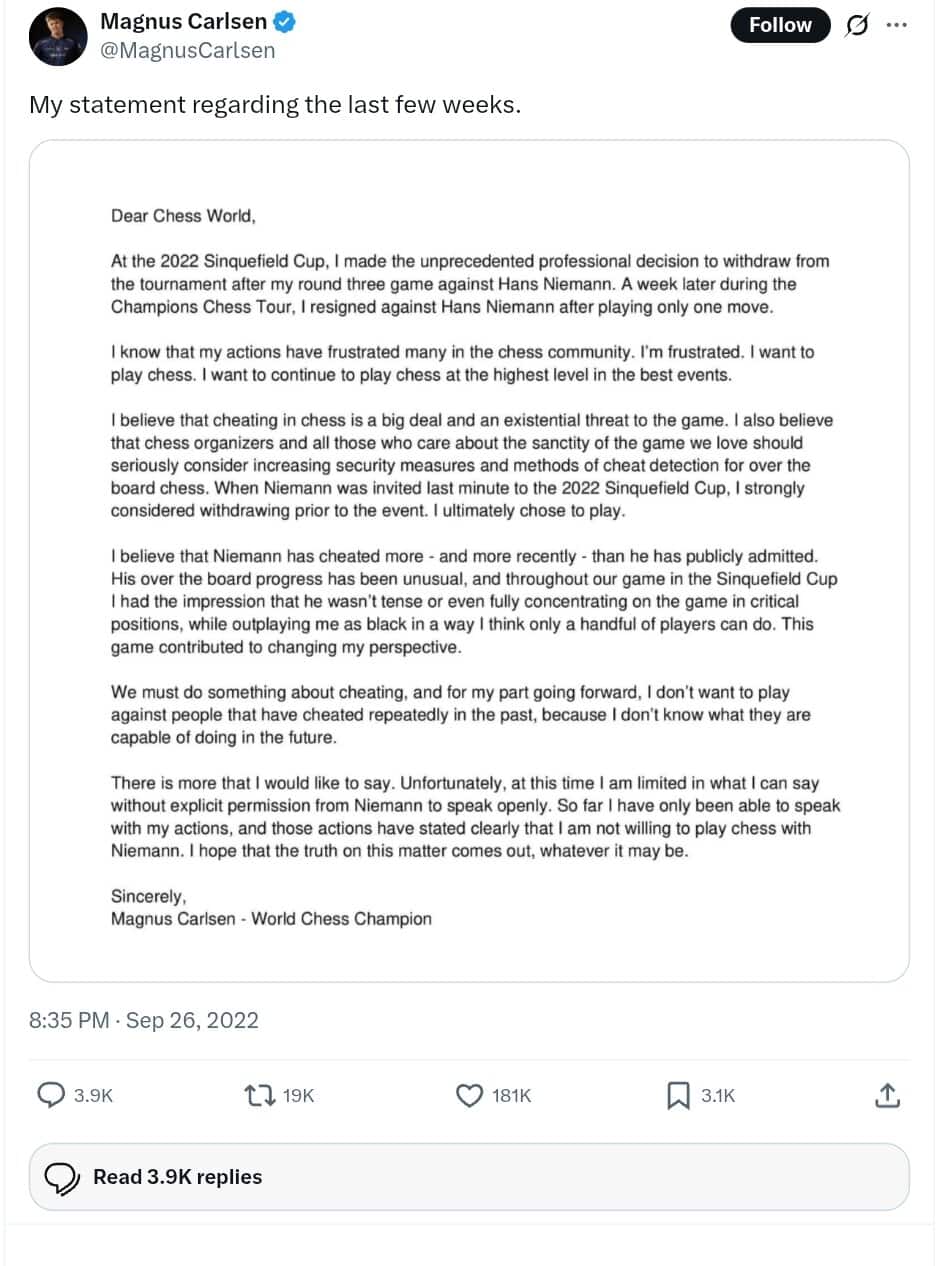
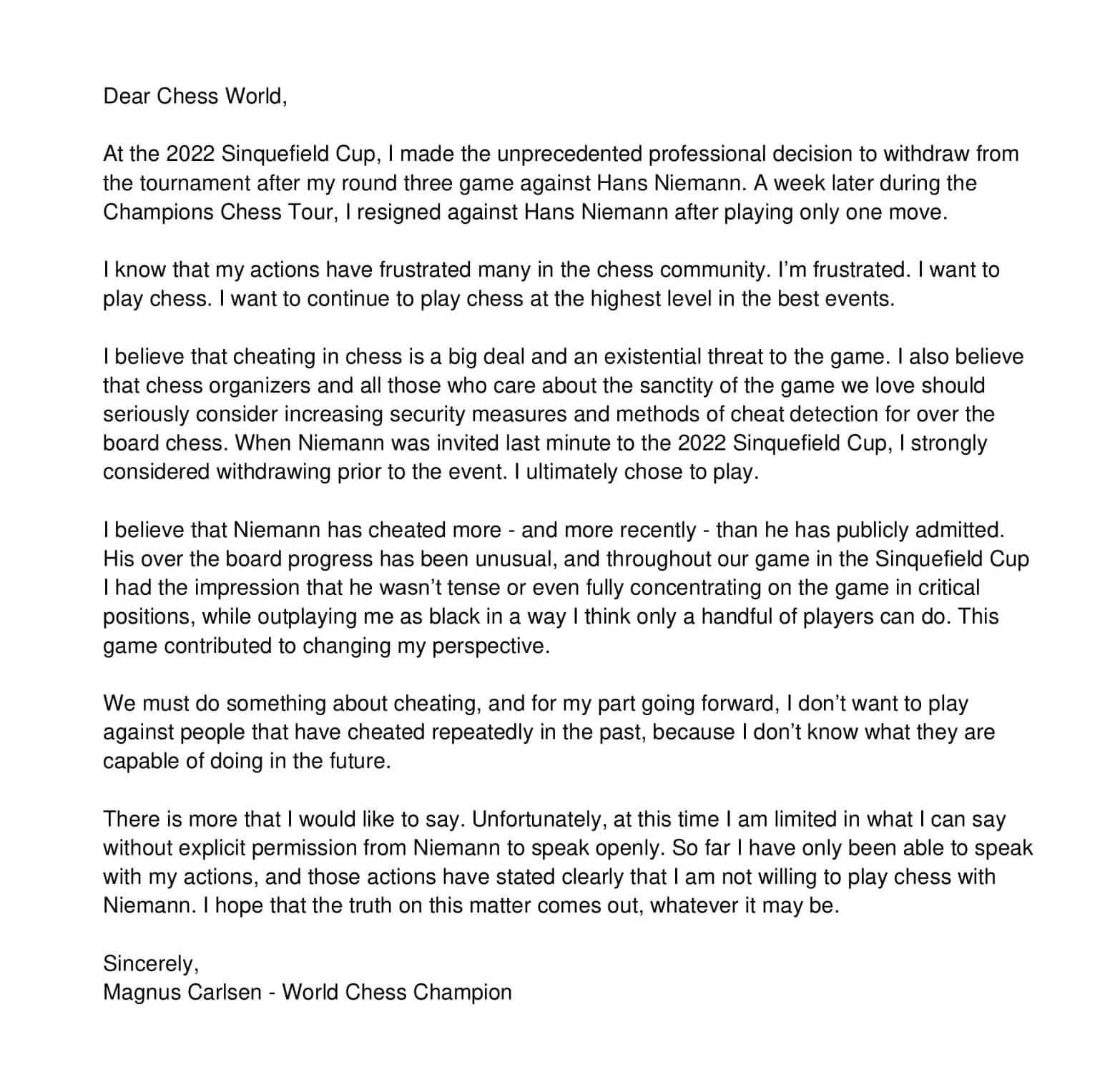
The Chess.com Report and Findings
Chess.com waded into the issue by banning Niemann and releasing a report to back the decision.
The platform’s 72-page report revealed extensive evidence of Niemann’s cheating in online games.
It showed evidence of cheating in far more games than he had initially admitted.
Chess.com’s findings contradict Niemann’s initial claims of only cheating twice as a child.
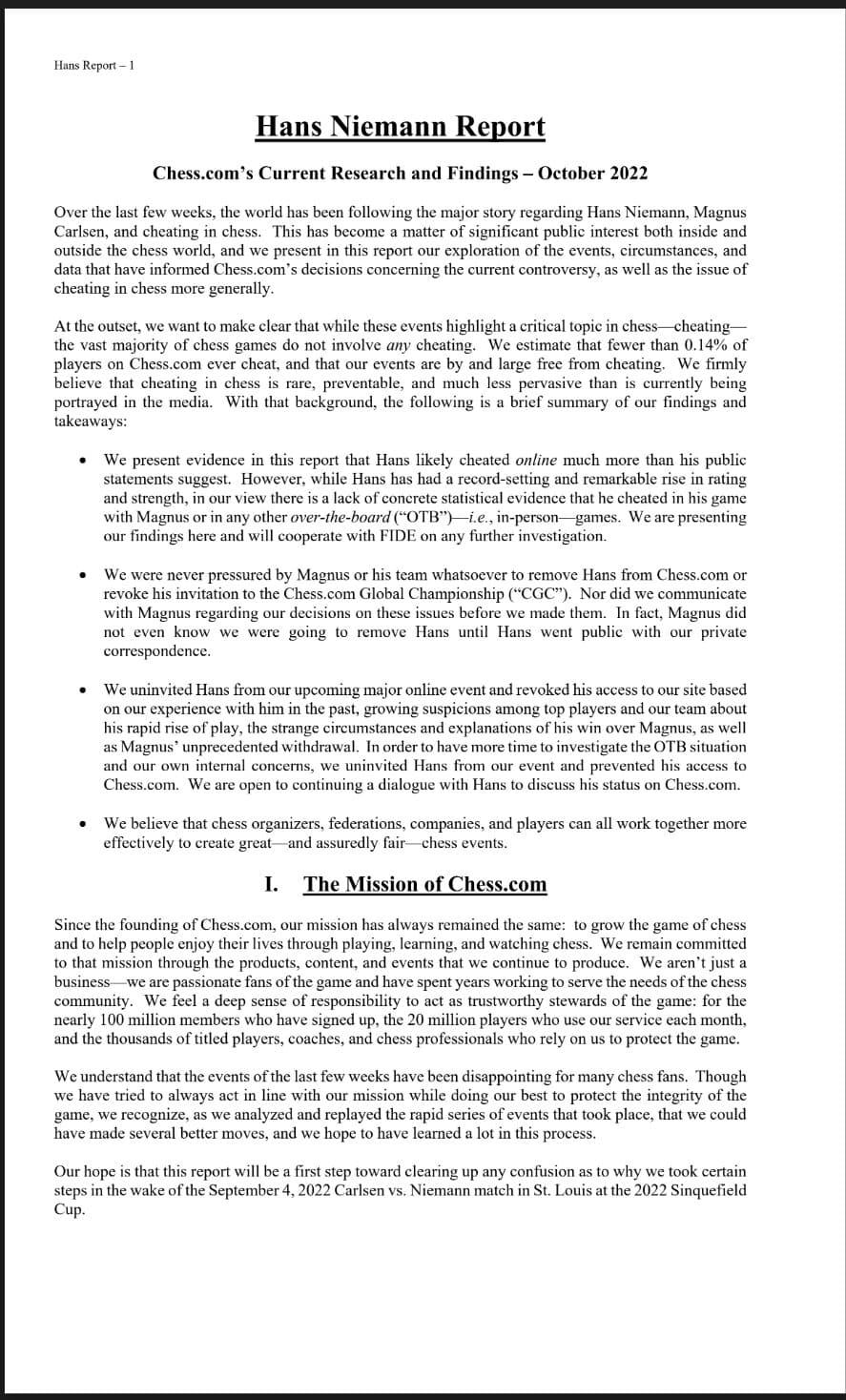
Niemann’s Admissions and Public Persona
Hans Niemann’s response to the storm of accusations has been a mixture of admission, defiance, and legal action.
This has contributed to the very complex public perception of him.
Admission of Online Cheating
Before becoming a grandmaster, Niemann publicly admitted to cheating online. He, however, added a big caveat that it was just twice.
He insisted multiple times that it had happened once, at 12, during a Titled Tuesday event, and again at 16.
Attributing his actions to youthful indiscretion and a desire to gain ratings.
His Rebuttals and Defiance
Niemann’s response to the allegations has been defiant. He has consistently and vehemently denied any over-the-board cheating.
He went as far as offering to play naked to prove his innocence.
One of the most bizarre part of the saga was the Hans Niemann anal bead theory. This theory claimed he used vibrating anal beads to receive external assistance.
A since-deleted tweet from Elon Musk partly fueled this bizarre rumor. Niemann explicitly denied using anal beads or any other device for cheating during OTB games.
In response to the allegations and bans, Niemann filed a $100 million defamation lawsuit. The lawsuit included defendants like Magnus, his company, Chess.com, and Hikaru Nakamura.
He alleged they were colluding to blacklist him from the chess profession. A U.S. District Court ultimately dismissed the lawsuit in June 2023.
Niemann’s Interactions and Reputation within the Chess Community
Hans Niemann’s personality contributed to his controversial image. Some players described him as highly confident to the point of perceived arrogance.
Even before the Carlsen scandal, some in the chess community reportedly harboured suspicions.
Controversies have marred Hans’ chess career, extending beyond the allegations of cheating.
Incidents outside the direct cheating allegations have also drawn attention.
In early 2024, the Saint Louis Chess Club banned Niemann from their invitational tournaments. Off-board drama has overshadowed his match against Dubov and other encounters.
The key moments of 2024 showed Niemann failing to prove his strength on the board when it mattered most.
This has further fueled scepticism about his abilities and legitimacy as a top-level player.
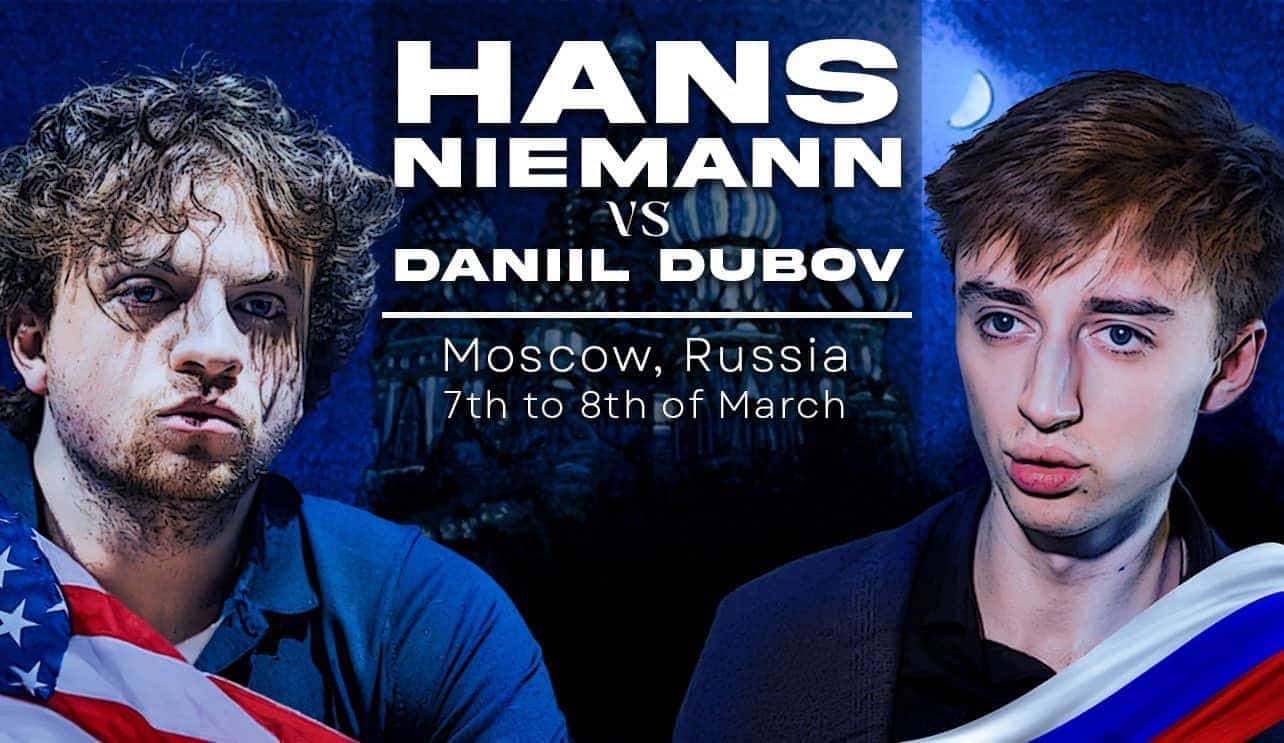
Comparing Niemann’s “Hate” to Other Controversial Figures in Chess History
Chess has had its fair share of very controversial figures. While the Niemann saga might seem all-consuming, it still needs some comparison.
If Niemann truly deserves the title of “most hated chess player,” we must examine other controversial figures.
Historical Examples of Divisive Chess Players
Chess history is marked by many controversial figures who have faced a backlash from the chess community.
Bobby Fischer, despite his undeniable genius, became a reclusive figure. He was known for his erratic behaviour, extreme demands, and offensive statements.
He gave up his world title and disappeared from public view for many years.
Viktor Korchnoi was another controversial player. Known for his fierce competitiveness and sometimes abrasive personality. His matches against Anatoly Karpov were very acrimonious.
More recently, Russian Grandmaster Sergey Karjakin has faced widespread condemnation and sanctions. He was banned by FIDE for a period and is considered persona non grata by many organizers.
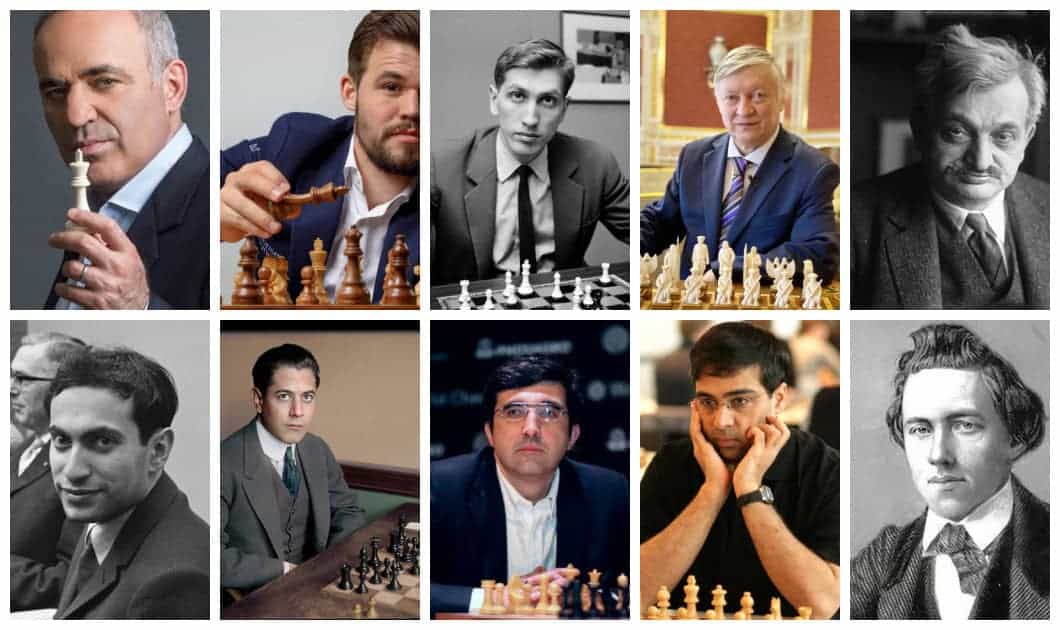
Nuances of the Dislike Towards Niemann
Niemann’s controversy centers on the core competitive aspect of chess: fair play.
The sentiment toward Niemann appears to be more complex than just simple “hate.” The chess community’s reaction often ranges from suspicion to genuine anger.
Many players and fans feel betrayed by what they perceive as his systematic dishonesty.
Niemann’s confrontational responses also fueled the storm of negative sentiment towards him.
Niemann has defenders who believe he is a talented youngster who has been unfairly scapegoated.
They point to the lack of definitive OTB cheating proof. They often argue that his past mistakes are being held against him.
The Impact on Niemann’s Career and Opportunities
The cheating allegations have had profound consequences for Niemann’s professional chess career.
Following the initial accusations, Niemann reported that tournament invitations dried up. He felt blacklisted. Many organizers are reluctant to deal with the controversy and security concerns his presence creates.
As one grandmaster put it,
“Now, if Niemann plays poorly, his rivals take it as proof he’s a fraud. But if he plays brilliantly, it only fuels their suspicions that he is somehow relying on AI”.
The path to consistently competing at the highest level against the world’s best remains bleak. Looking ahead, the 2025 chess tournament calendar presents Niemann with limited opportunities.
Conclusion: A Complex Picture of Perception
Whether “most hated” is an accurate descriptor is subjective and difficult to prove definitively.
The term “most controversial” is perhaps more fitting, as his situation sparks endless debate.
He certainly elicits high drama and suspicion from a large and vocal segment of the chess world. However, he also has supporters who see him as a persecuted talent.
Hans Niemann’s story is far from over. Whether he can rebuild his reputation remains an open question.
Chess history suggests that redemption is possible. To achieve that requires honest behavior, strong performance, and time.
Until then, Hans Niemann will probably remain one of the most polarizing figures in chess in the present age.
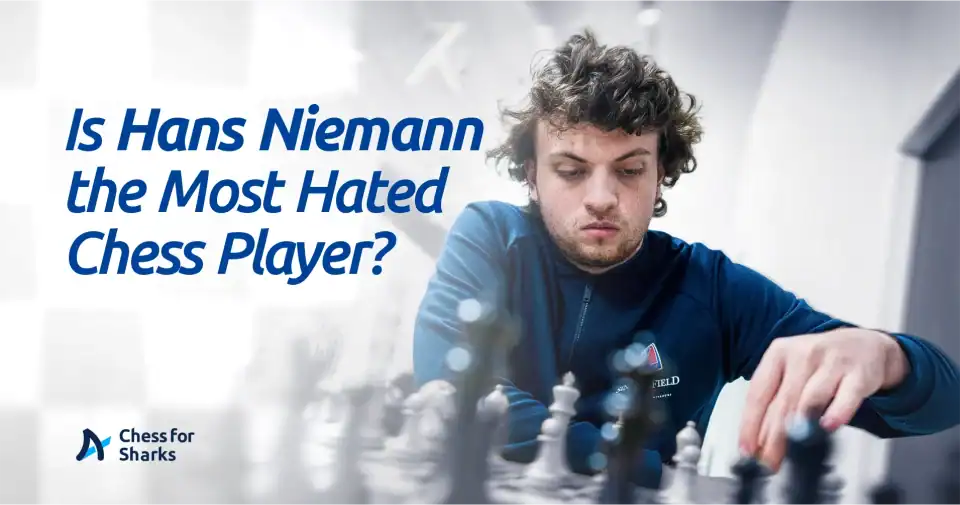



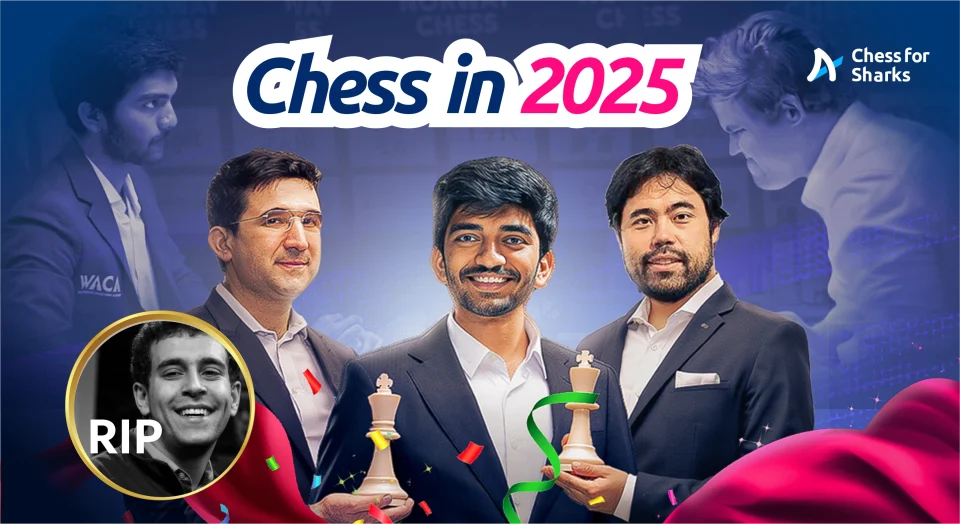

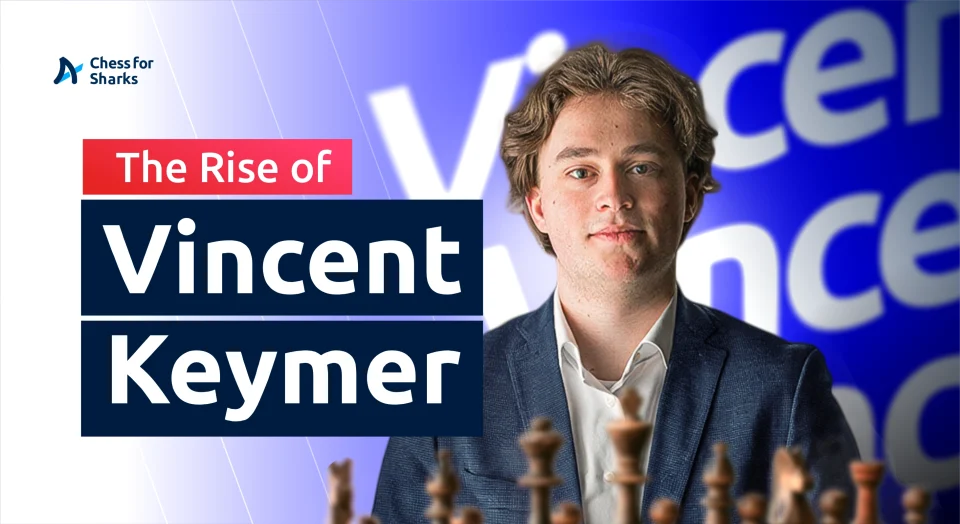
join the conversation